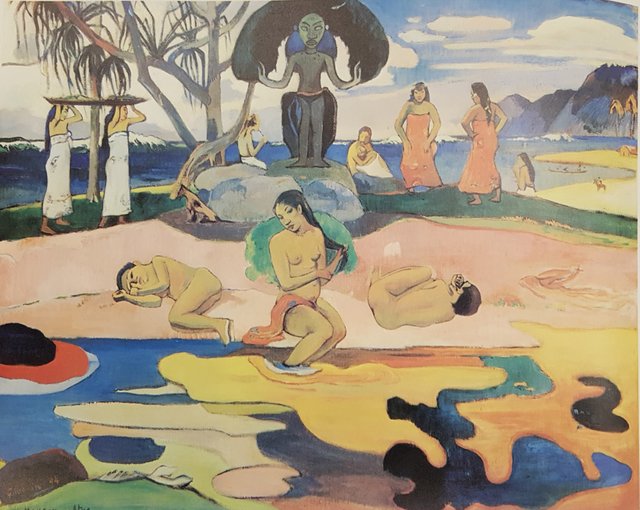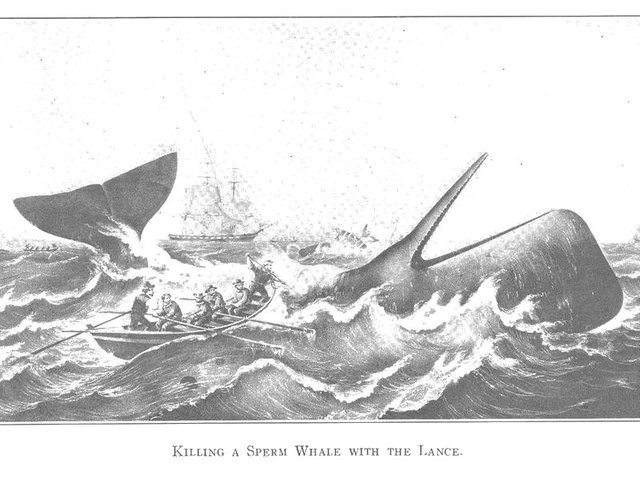Extolling The Virtues of Whaling
("Moby Dick", pp. 118-122 in the Penguin edition from 2003)
Part Two

Blame whales, I say. Blame ‘em for everything. Absolutely everything.
That may go too far. And of course it is not I who could possibly extoll the virtues in the heading, but Melville's Ishmael does (in chapter 24, "The Advocate", in “Moby Dick”).
Why now did I suddenly find myself proclaiming: Blame the whale!? In my kitchen, not quite seasick, yet - I had come to chapter 24: the chapters are short and we have only just set sail upon the Atlantic - making soup, imagining myself the fisherman’s wife, waiting for my man to return (listening to the book on my headphones), I grumbled, that darn whale has a lot to answer for!
Doing what a good reader is supposed to do, I was suspending my judgment on the cruelty of whaling and going along with the context of Ishmael, in which the killer monster fish was seen as no more than an obvious prey to hunt; but of course, at the same time, the woman I am stirs her soup in a very different sphere, as well.
Accepting the morally fine and respectable aspects of 19th century whaling as a base-line for the plot, my modern mind discovered what a major part this fellow sensitive terrestrial and intelligent mammal has played, center stage in so many human lives, economies, and ultimately, our communal general progress. I add up the ways he hurried along our destructive enterprises.

Another Great Christmas Gift: this time from Jellycat, "Wilbur the Whale".
Yeah (yay), call me Ishmael, as I blame the whale!
For me, an occasional student of Chassidic Kabbala, the story of Jonah and the whale already shows me, that mystically the whale has a very special place in the Mythology of the Evolution of Consciousness. I can refer you with much excitement to the in-depth study sessions by Mendel Dubov for a detailed analysis of this Old Testament story that has stayed with us ever since (just look to art and literature). I was fascinated by the extensive Jewish rabbinical explanations in the very necessary parts 1-4, but, personally, I was even more deeply satisfied by the Chassidic spiritual skeleton in the fifth video.

Considering, then, in a mid-19th century state of mind:
This man-eating leviathan (or at least, one of them chomped off Ahab's leg), has been designed in God’s infinite wisdom, so it could only get what he had coming to him (according to the Plan). God creates with foresight and intent, right? Well, there exactly is the rub and pivot of Moby Dick, the novel. Melville was having trouble with these traditional, creationist, religious principles. How could God have made the whale and seen that it was good? Indeed, Melville emphasises how the whale brings out the worst in man. Let's go with that for a moment and see if it brings us to a new metaphysical level.
Initially, millions of years before man arrived on the scene to utter his poorly written lines, it was of course very fine swimming for the sizeble schools of whale. All was well. What would have swayed God to alter his Master Plan and fit the whale out with a more demure size and allot to him safer depths where he might rake the bottom of the ocean less conspicuously (although He kitted the narwal out with a horn to inspire him to that extent, if we go on Melville’s belief that the horn was such a food-searching rake).
Let us list the undesirable behaviours the whale inspired in man.
Ever since the mid-1700’s the Dutch, the French, the British were tempted by the whale to spend millions of pounds on whaling fleets.
There were seven million dollars per annum profit (for US alone) in catching whales in 1850. Considering each voyage tended to last four years, there had to be a lot of whaling going on. The whale swept man up to ever greater heights of greed!

Paul Gauguin: The Day of The God (Mahana no Atua); 1894
“The whale-ship is the true mother of Australia”
If the whale had not beckoned man to the remotest South Seas like a siren, men would not have got in their whaling ships and sailed to discover parts of the world they would otherwise have left well enough alone as unalluring spots.
Were it not for the whale the Australian indigenous people could have evolved their civilisations undisturbed by our glorious salutes. Nobody cared about those “pestiferously barbarous” coasts after Tasman pulled his nose up at them. But then the whale had to go and ruin it for the Aboriginal people, inviting whalers to settle in the Antipodes, so that it might be chased like a toddler around the room before bedtime, only to turn around and bite off a leg! And then chase you for more….
I can go on pointing the finger at Mister Whale. He spoiled it for the Polynesians, bringing missionaries and merchants to their shores. (Then again, we would also have missed out on many a Paul Gauguin.) And he had already corrupted the Japanese, but now he could lock east and west in maritime, mercantile battle. See, the whale: the devil incarnate, bringing out the worst in man!

Mocha Dick: The Real-Life Whale That Gave Moby Dick His Name
"An utterly fearless man is a far more dangerous comrade than a coward."
There I was, ladle in hand, sprinkling a handful of parley, looking from within that vescia pices of two worlds overlapping (Melville’s and mine) at a causitive pattern that the whale was weaving around our globe. He was showing up an ugly, gruesome pattern of man as a bestial brute. But also, especially thinking of whalers like Queequeg, of man as a quester for truth and beauty, and a deeper meaning to life.
It suddenly occurs to me, while Ishmael is summing up all the positive and admirable qualities in whaling, we cannot possibly find praiseworthy, now, must even lament, how immense the sacrifice of one species, on so many layers can be. At the expense of near extinction of himself, the whale has drawn man out to explore great depths of darkness within himself. Had it not been the whale, though.... indeed, are there not so many other species and individuals who continue to sacrifice themselves for the Awakening of Man?
If we are all interconnected, and Consciousness includes every little creature great and small, then this is both tragic and mind-boggling. I will hesitate to say, miraculous, but from a very distant star, all our conflicts however vile, on this planet are dynamically wonderous to behold - in comparison to all the other life-less globes in the universe.
The cost of civilisation, free markets, liberalism, humanism and reason have been exorbitant; and still we haven't come gloriously far, yet! The bravest one in the story of whaling is the whale!
When I said "blame" I meant to hold onto Ishmael's observations to wire them into a larger, more cosmic and timeless perspective, till I could see in the whale a spiritual catalyst.
The metaphysician thanks the whale, deeply indebted, head bowed low.
I have a faint feeling Melville might have tried to grasp hold of a deeper meaning to the butchery and callousness (the darkness) of man, with that fasination of his for the Zoroastrians (he met during his own sailing days). He grappled with the challenge of how to design a new kind of faith - and sadly seems to have failed (spinning in upon his melancholia towards the end of his life). Not unlike most of us modern folk, he never trusted in providence or cosmic guidance, or the kind of faith that makes life renewedly possible. It leaves the book highly relevant to our time. It leaves us with the poignant question: if in God we can no longer trust, with all his seas explored, and none of them proving idyllic, pure and full of promise, where now to fish for hope?
Someone new to blame!
Thinking one final thought, I mark the absence of women in the history of whaling. Or so I initially thought, until I came to consider all the female whims the whale served (granted, possibly promoted by men in the first place, with women having very little to say for themselves at the time) - think of the baleens and spermazetti, which works miracles in face creams; and the ambergris in perfumes.
Clearly this must bring us to the conclusion:
Poor whale: blame women!!

Who sacrifices themselves for the awakening of Man?
Poor whale: blame women!
Silly rabbit, tricks are for kids!
With you, in wiring into a larger, more cosmic and timeless perspective, to SEE, and then I am blinded with anger both here, perhaps there, perhaps everywhere by the promised jewels in a crown sitting in some later realm for having been meekly courageous in our very particular, never-ending service.
What is top is down.
At times, life can feel so linear.
Downvoting a post can decrease pending rewards and make it less visible. Common reasons:
Submit
And we were meek and we were courageous and we did serve in sacrifice.
Terribly blinded by anger yesterday (call it hatred!) I felt all that cosmic jewelry wasted. One can only pull it down to a personal level; but so with you in that later realm.
Dangling my legs from a cloud this morning, wondering why on earth I should bother jumping down this time again, I find renewed vigour in your silly rabbit.
Off to do some more tricks.
Downvoting a post can decrease pending rewards and make it less visible. Common reasons:
Submit
I very much like the image of you dangling your legs from a cloud and feel gratitude in knowing someone out there is having similar thoughts, familiar with a trail I've so often felt alone on.
Smiles :)
Downvoting a post can decrease pending rewards and make it less visible. Common reasons:
Submit
Hi sukhasanasister,
Visit curiesteem.com or join the Curie Discord community to learn more.
Downvoting a post can decrease pending rewards and make it less visible. Common reasons:
Submit
Congratulations @sukhasanasister! You have completed the following achievement on the Steem blockchain and have been rewarded with new badge(s) :
Click here to view your Board of Honor
If you no longer want to receive notifications, reply to this comment with the word
STOPDownvoting a post can decrease pending rewards and make it less visible. Common reasons:
Submit